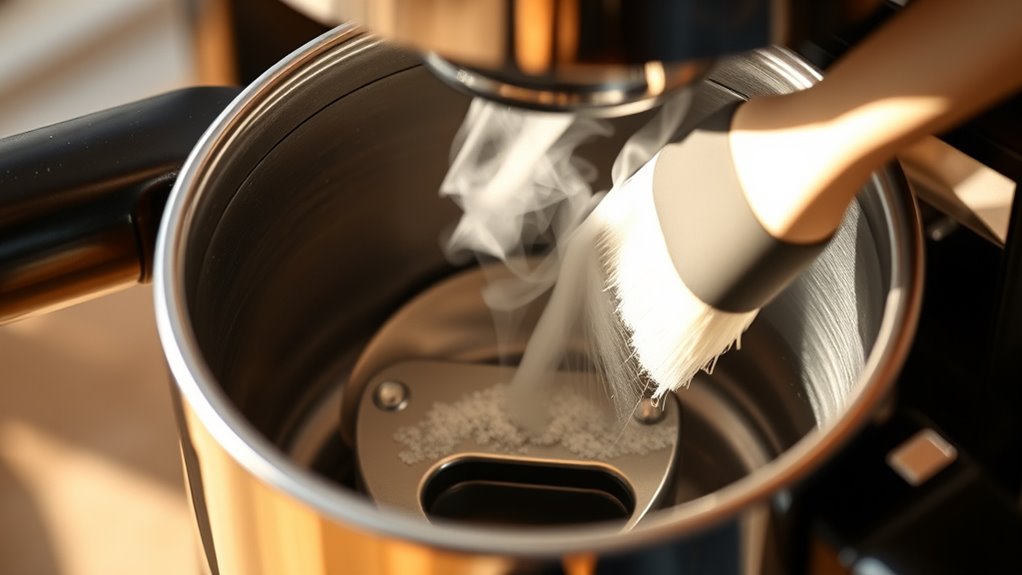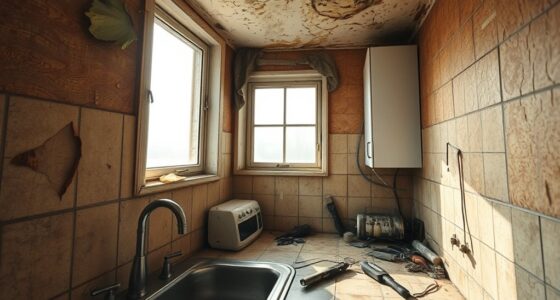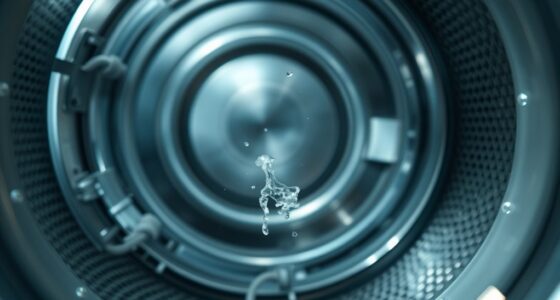To keep your coffee maker in peak condition, regularly descale it to prevent mineral buildup from hard water. Use equal parts vinegar and water, run a brew cycle without coffee, then let it sit for 20 minutes. Follow with plain water cycles to rinse. Using filtered water and cleaning every 1-3 months helps maintain best performance and taste. Keep watching to discover more expert tips on easy descaling methods and maintenance.
Key Takeaways
- Regularly descale your coffee maker using a vinegar solution to dissolve mineral deposits and maintain optimal performance.
- Use filtered or softened water to reduce mineral buildup and extend cleaning intervals.
- Run multiple water-only cycles after descaling to thoroughly rinse out vinegar and debris.
- Monitor water hardness to determine appropriate cleaning frequency and prevent excessive buildup.
- Consistent maintenance prolongs your coffee maker’s lifespan and ensures consistently great-tasting coffee.

If your coffee maker isn’t brewing as efficiently as it used to, mineral buildup from hard water might be the culprit. Hard water contains dissolved minerals like calcium and magnesium, which accumulate in your machine over time. This mineral buildup can clog the water flow, extend brewing times, and even affect the taste of your coffee. To keep your coffee maker running smoothly, understanding water hardness is essential. Water hardness refers to the concentration of these minerals; the higher the hardness, the faster your machine will accumulate deposits. Regular cleaning with vinegar is one of the most effective and affordable ways to combat this issue.
Vinegar cleaning works because vinegar, specifically distilled white vinegar, has acetic acid that dissolves mineral deposits. To start, fill the water reservoir with a mixture of equal parts vinegar and water. Run the brew cycle as if you’re making coffee, but do not add coffee grounds. This process allows the vinegar solution to pass through the internal parts, breaking down mineral buildup along the way. After the cycle completes, let the vinegar solution sit for about 15-20 minutes to maximize cleaning power. This pause helps loosen stubborn deposits that might be stuck in small crevices or valves. Then, run a few cycles with just plain water to rinse out any remaining vinegar and loosened deposits.
Using filtered water** can significantly reduce mineral deposits and minimize the frequency of descaling needed, especially in areas with very hard tap water. Repeating this cleaning process every one to three months, depending on your water hardness, keeps mineral buildup under control and your coffee tasting fresh. Beyond vinegar cleaning, it’s wise to contemplate the water you use regularly. If your tap water is particularly hard, investing in a water softener** or using filtered water can considerably reduce mineral deposits. Softened or filtered water contains fewer minerals, reducing the frequency and intensity of descaling needed. Keep in mind, however, that vinegar cleaning is a quick, cost-effective solution that works well for most households, especially if you notice your machine isn’t performing as it should.
Frequently Asked Questions
How Often Should I Descale My Coffee Maker?
You should descale your coffee maker every 1 to 3 months, depending on your water quality and usage. Regular water filter maintenance also helps prevent mineral buildup, reducing cleaning frequency. If you notice your coffee’s taste changing or longer brewing times, it’s time to descale. Keeping up with cleaning and filter maintenance guarantees your machine stays in top shape, providing you with delicious, fresh coffee every time.
Can I Use Vinegar for Descaling?
They say, “A penny saved is a penny earned,” and that’s true with descaling. You can use vinegar benefits as an effective, budget-friendly alternative solution for removing mineral buildup. Vinegar works well, but it’s not the only option. Just be sure to run a thorough water rinse afterward to prevent any lingering taste. Always check your coffee maker’s manual before using vinegar, as some brands advise against it.
What Are Signs My Coffee Maker Needs Descaling?
If your coffee maker shows signs like slow brewing, weak coffee, or strange tastes, it likely needs descaling. Mineral buildup from hard water can clog your machine and reduce performance. You might also notice inconsistent water flow or longer brewing times. Regular descaling helps remove mineral deposits, restoring your coffee maker’s efficiency and ensuring better-tasting coffee. Keep an eye on these signs to maintain ideal machine performance.
Does Descaling Affect the Coffee’S Taste?
Imagine brewing with a crystal-clear stream—that’s how your coffee should taste. Descaling removes mineral buildup caused by poor water quality, which can dull flavors. If you skip it, your coffee might taste flat or bitter, like drinking from a cloudy pond. Regular descaling keeps water flowing smoothly, ensuring your brew remains rich and flavorful, just like that pristine mountain spring you’d love to sip from every morning.
Are There Eco-Friendly Descaling Alternatives?
If you’re looking for eco-friendly descaling alternatives, you’re in luck. Biodegradable solutions and natural descaling methods are great options. You can use vinegar or lemon juice, which are safe for the environment and effective at removing scale buildup. These natural descaling methods not only protect your coffee maker but also reduce chemical waste, making your routine greener and healthier for both you and the planet.
Conclusion
Don’t skip descaling your coffee maker, even if you’re busy—trust me, it’s worth the time. While it might seem like a hassle, regular descaling keeps your machine running smoothly and brews tastier coffee. Plus, it prevents costly repairs down the line. So, set a reminder, take a few minutes, and give your coffee maker some TLC. Your morning cup will thank you with richer flavor and peak performance every time.









